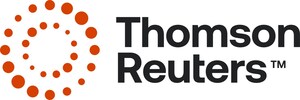Thomson Reuters Analysis Shows China's Patent Dominance despite Stagnant Foreign Innovation Investment
-- Pharma Driving Surge but Quality Is Suspect; Huawei, Alibaba and Lenovo Among Top Global Filers
ALEXANDRIA, Virginia, Dec. 8, 2014 /PRNewswire/ -- The Intellectual Property & Science business of Thomson Reuters, the world's leading source of intelligent information for businesses and professionals, today released research outlining the patent landscape in China, and best practices for developing a strategic outlook on the emerging areas in the country's portfolio. The new paper, Chinese Corporate Trends and Globalization for IP, identifies not only where China's output has grown, but where it will go next and the best practices to capitalize on burgeoning areas of innovation.
China's rise in patent dominance and eclipsing of Japan and the U.S. has long been predicted. In 2013, China not only passed, but dwarfed both countries' patent output. Insight into the Chinese patent portfolio shows that, over a decade, the ratio of domestic to foreign applications has also shifted from just under 50 percent to over 75 percent. As a result, the Chinese rate of patent growth over the evaluated 10-year span dwarfs all competitors, as the country increased its overall invention patent applications from 40,000 in 2003 to over 600,000 in 2013.
Key points outlined in the analysis include:
- China Is Undisputed Patent Leader: China continues to overshadow other countries in published patent applications, publishing 629,612 patents in 2013, over 200,000 more than the U.S. This push is driven by a five-year plan in which the country has set out to reach two million applications for patents for inventions, utility models and designs by 2015.
- Pharma Driving Patenting Boom, But Quality of IP is Suspect: China has nearly 80 percent of world share in patents for alkaloid/plant extracts, and around 60 percent of global share of pharmaceutical activity, general patents. However, these filings are held by thousands of individual inventors with a handful of patents each, rather than portfolios maintained by universities or corporate entities that would be seen stateside. As a result, the quality of the IP is likely to be unstable.
- Domestic Innovation on the Rise, Foreign Filing Fails to Keep Up: Overall, 80 percent of China's patents were filed domestically in 2013, leaving China's foreign growth flat. The number of inventions filed abroad from China has grown from 13,005 in 2008 to 33,222 in 2013, however overall patenting has grown from 239,663 in 2008 to 629,612 in 2013, therefore the proportion has remained the same at 5.3 percent.
- Burgeoning Chinese Multinationals: While China as a whole is doing substantially less international patent filing than other regions of the world, a few leaders have emerged in the global patent landscape, including Huawei, ZTE Corp, Shenzhen Huaxing Optoelectronic, Alibaba Group, BOE Technology Gropu, Lenovo, Tencent, BYD, SMIC and Sany. Huawei was named to the Thomson Reuters 2014 Top 100 Global Innovators list last month.
- Planning the Next Five Years: The Chinese National Patent Development Strategy highlights the country's plans through 2020, including seven strategic industries positioned for growth: biotechnology, alternative energy, clean energy vehicles, energy conservation, high-end equipment manufacturing, broadband infrastructure, and high-end semiconductors.
"Over the past decade, China has asserted itself as one of the preeminent players in intellectual property activity," said Bob Stembridge, senior patent analyst, Thomson Reuters IP & Science. "By developing an IP strategy that accounts for China's continued foray into the innovation landscape, firms can glean an advantage in this emerging market."
Read more on Chinese Corporate Trends and Globalization for IP.
About Thomson Reuters
Thomson Reuters is the world's leading source of intelligent information for businesses and professionals. We combine industry expertise with innovative technology to deliver critical information to leading decision makers in the financial and risk, legal, tax and accounting, intellectual property and science and media markets, powered by the world's most trusted news organization. For more information, go to www.thomsonreuters.com.




Share this article